-
 Bitcoin
Bitcoin $84,027.9759
2.46% -
 Ethereum
Ethereum $1,868.9184
3.62% -
 Tether USDt
Tether USDt $0.9999
-0.02% -
 XRP
XRP $2.1404
3.93% -
 BNB
BNB $608.5760
2.62% -
 Solana
Solana $127.7297
3.30% -
 USDC
USDC $0.9999
-0.01% -
 Dogecoin
Dogecoin $0.1710
5.08% -
 Cardano
Cardano $0.6762
5.78% -
 TRON
TRON $0.2336
0.22% -
 Toncoin
Toncoin $4.0972
4.94% -
 Chainlink
Chainlink $13.9977
6.46% -
 UNUS SED LEO
UNUS SED LEO $9.3579
2.79% -
 Stellar
Stellar $0.2723
3.57% -
 Avalanche
Avalanche $19.5472
5.47% -
 Sui
Sui $2.3949
8.42% -
 Shiba Inu
Shiba Inu $0.0...01277
5.59% -
 Hedera
Hedera $0.1686
6.73% -
 Polkadot
Polkadot $4.1923
4.63% -
 Litecoin
Litecoin $84.3839
3.09% -
 Bitcoin Cash
Bitcoin Cash $313.2147
5.42% -
 MANTRA
MANTRA $6.2977
1.06% -
 Bitget Token
Bitget Token $4.5990
3.79% -
 Dai
Dai $1.0000
-0.01% -
 Ethena USDe
Ethena USDe $0.9997
-0.02% -
 Pi
Pi $0.7146
2.62% -
 Hyperliquid
Hyperliquid $13.4755
6.01% -
 Monero
Monero $217.5707
1.09% -
 Uniswap
Uniswap $6.1306
4.95% -
 Aptos
Aptos $5.3255
2.93%
The relationship between block browsers and decentralized applications
Block browsers are essential for dApps, enabling transaction verification, smart contract inspection, and performance monitoring, enhancing transparency and usability.
Mar 30, 2025 at 07:35 pm
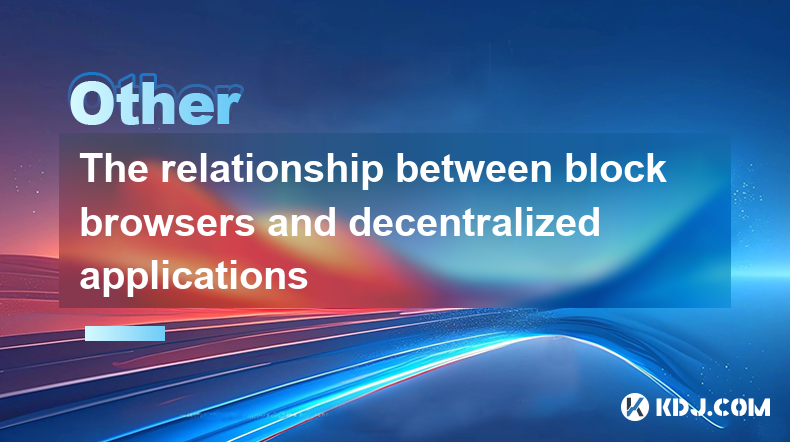
Understanding the Interplay
Block browsers and decentralized applications (dApps) share a symbiotic relationship within the cryptocurrency ecosystem. Block browsers act as crucial tools for interacting with and monitoring the blockchain, while dApps leverage this underlying blockchain infrastructure to provide their functionality. This interplay is essential for the transparency and usability of dApps. Without block browsers, verifying transactions and data within a dApp becomes significantly more difficult.
How Block Browsers Facilitate dApp Usage
Block browsers provide users with a window into the blockchain's activity. This is critical for dApp users because it allows them to:
- Verify transactions: Users can confirm that transactions related to their dApp interactions have been successfully processed and recorded on the blockchain. This ensures the integrity of the dApp's operations.
- Inspect smart contracts: Many dApps rely on smart contracts. Block browsers enable users to examine the code of these contracts, understanding their functionality and ensuring they operate as intended. This promotes transparency and accountability.
- Monitor dApp activity: By analyzing blockchain data, users can track the usage and performance of a specific dApp. This information can be valuable for understanding the dApp's popularity and identifying potential issues.
- Debug dApp issues: If a dApp malfunctions, block browsers can help users identify the root cause by examining the transaction history and smart contract interactions. This aids in troubleshooting and resolution.
The Role of Block Explorers in dApp Development
For developers, block browsers are indispensable during the dApp development lifecycle. They offer several key benefits:
- Testing and debugging: Developers can use block browsers to simulate transactions and test their dApps' functionality in a real-world environment before launch. This helps identify and resolve bugs early on.
- Monitoring performance: During and after deployment, developers can monitor the performance of their dApps by analyzing blockchain data provided by block browsers. This allows for optimization and improvement.
- Security auditing: Block browsers facilitate the process of security audits by allowing independent parties to review the smart contract code and transaction history. This helps identify potential vulnerabilities.
- Understanding user behavior: Analyzing blockchain data through block browsers helps developers understand how users interact with their dApps, enabling them to improve the user experience and add new features.
Different Types of Block Browsers and Their Suitability for dApps
Various block browsers cater to different blockchains and offer varying levels of functionality. Some are highly specialized, focusing on specific blockchains or features, while others offer a more generalized approach. The choice of block browser often depends on the specific blockchain used by the dApp. Choosing a reputable and reliable block browser is essential for ensuring the accuracy and security of dApp interactions.
Security Considerations When Using Block Browsers with dApps
While block browsers are essential tools, users must be aware of potential security risks:
- Phishing websites: Be cautious of fake block browser websites that mimic legitimate ones. Always verify the URL and ensure you are using a trusted source.
- Malicious extensions: Avoid installing untrusted browser extensions that claim to enhance block browser functionality. These extensions could potentially steal your private keys or compromise your data.
- Data privacy: Be mindful of the data you share when interacting with dApps through block browsers. Some block browsers may collect user data, so review their privacy policies carefully. Always prioritize using reputable and well-established block browsers.
The Future of Block Browsers and dApps
As the cryptocurrency space continues to evolve, block browsers will likely play an even more significant role in the development and usage of dApps. We can expect to see more sophisticated and user-friendly block browsers emerge, improving the overall user experience and accessibility of dApps. Improvements in indexing and data visualization will further enhance the utility of block browsers for both users and developers. The integration of advanced analytics and visualization tools will also contribute to better understanding and monitoring of dApp performance and user behavior.
The Importance of Transparency and Accessibility
Transparency and accessibility are crucial aspects of both block browsers and dApps. Block browsers contribute to transparency by providing a public record of blockchain activity, allowing anyone to verify transactions and smart contract interactions. This transparency is essential for building trust and accountability within the dApp ecosystem. User-friendly interfaces and clear documentation are essential for making dApps accessible to a wider audience. Block browsers play a crucial role in achieving this accessibility by providing tools that simplify the interaction with the underlying blockchain technology.
Addressing Common Questions
Q: Can I use any block browser with any dApp?
A: No, the compatibility depends on the blockchain the dApp is built on. A block browser for Ethereum will not work with a dApp built on Solana. You need a block explorer that supports the specific blockchain.
Q: Are block browsers secure?
A: Reputable block browsers employ robust security measures. However, users should always be vigilant against phishing and malicious extensions. Using a trusted and well-known block browser significantly reduces risks.
Q: What information can I find on a block browser regarding a dApp?
A: You can typically find transaction history related to the dApp, smart contract code (if applicable), and overall activity on the blockchain related to the dApp.
Q: How do block browsers help with dApp debugging?
A: By examining transaction details and smart contract interactions, developers can pinpoint errors and malfunctions within their dApps. This allows for efficient debugging and improvement.
Q: Are there any limitations to using block browsers?
A: Some block browsers might have limitations in terms of the amount of data they can display or the speed of their search functionality, especially for very large and active blockchains. The level of detail provided can also vary between different block explorers.
Disclaimer:info@kdj.com
The information provided is not trading advice. kdj.com does not assume any responsibility for any investments made based on the information provided in this article. Cryptocurrencies are highly volatile and it is highly recommended that you invest with caution after thorough research!
If you believe that the content used on this website infringes your copyright, please contact us immediately (info@kdj.com) and we will delete it promptly.
- Dogecoin (DOGE) On Track to Complete Its Most Bearish Q1 in 7 Years
- 2025-04-01 19:10:12
- The Ultimate Guide to Buying the Best Pre-Sale Meme Coins During a Market Downturn
- 2025-04-01 19:10:12
- Mutuum Finance (MUTM) Captures Investor Attention as Stellar Lumens (XLM) Faces Price Fluctuations
- 2025-04-01 19:05:12
- IntelMarkets Continues Its Impressive Run, Raising Over $12.1M in Its Presale and Already Delivering 300% Returns to Early Investors
- 2025-04-01 19:05:12
- Bitcoin vs. Gold: Which Will Dominate This Cycle?
- 2025-04-01 19:00:12
- Stablecoin bills in the US are drawing attention from institutional investors and politicians.
- 2025-04-01 19:00:12
Related knowledge
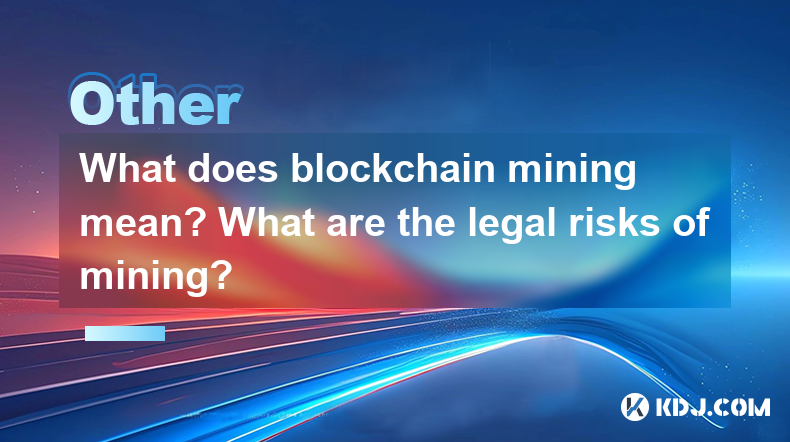
What does blockchain mining mean? What are the legal risks of mining?
Mar 31,2025 at 05:07pm
Blockchain mining is the process by which transactions are verified and added to the public ledger, known as the blockchain. Miners use powerful computers to solve complex mathematical problems, which, once solved, allow them to add a block of transactions to the blockchain. In return, miners are rewarded with cryptocurrency, typically Bitcoin. This pro...
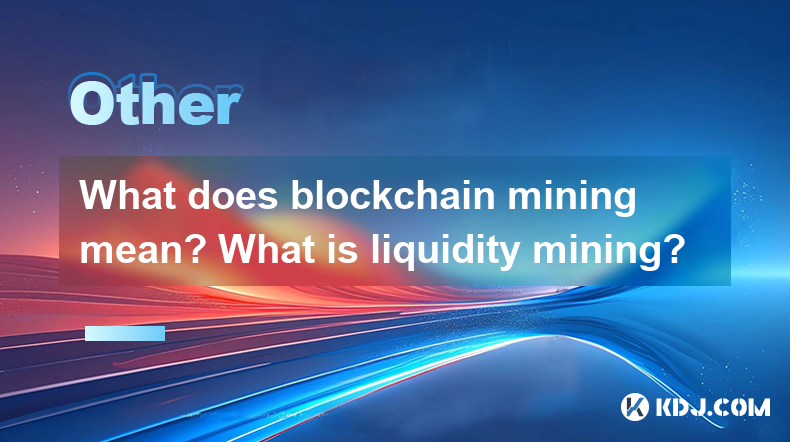
What does blockchain mining mean? What is liquidity mining?
Apr 01,2025 at 12:07am
What is Blockchain Mining?Blockchain mining is a critical process in the world of cryptocurrencies, particularly for networks like Bitcoin and Ethereum. It involves the use of computational power to solve complex mathematical problems, which in turn validates transactions and adds them to the blockchain. Miners are incentivized through rewards, typicall...
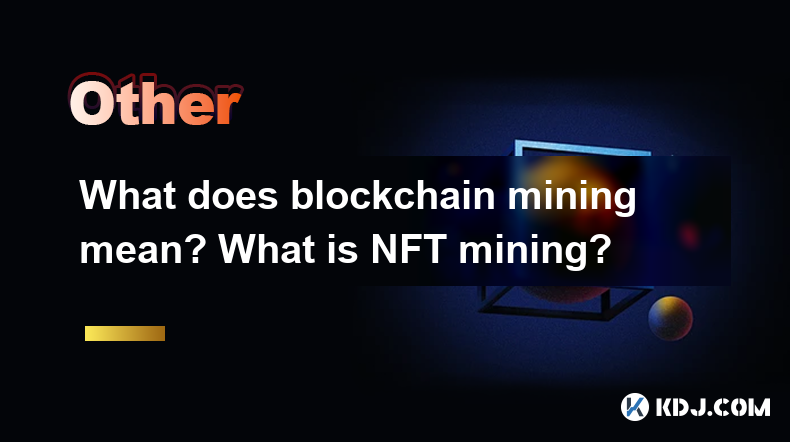
What does blockchain mining mean? What is NFT mining?
Mar 31,2025 at 04:07pm
Blockchain mining is a crucial process in the world of cryptocurrencies, particularly for networks like Bitcoin and Ethereum. It involves verifying transactions and adding them to the blockchain, a decentralized ledger. Miners use powerful computers to solve complex mathematical problems, which, when solved, allow them to add a block of transactions to ...
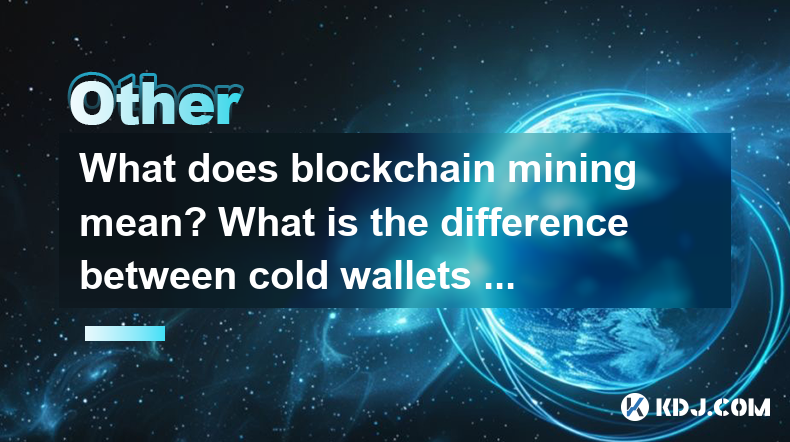
What does blockchain mining mean? What is the difference between cold wallets and hot wallets for mining?
Apr 01,2025 at 07:56am
Blockchain mining is a critical process in the world of cryptocurrencies. It involves verifying transactions and adding them to the blockchain, a decentralized ledger. Miners use powerful computers to solve complex mathematical problems, which, when solved, allow them to add a block of transactions to the blockchain. In return, miners are rewarded with ...
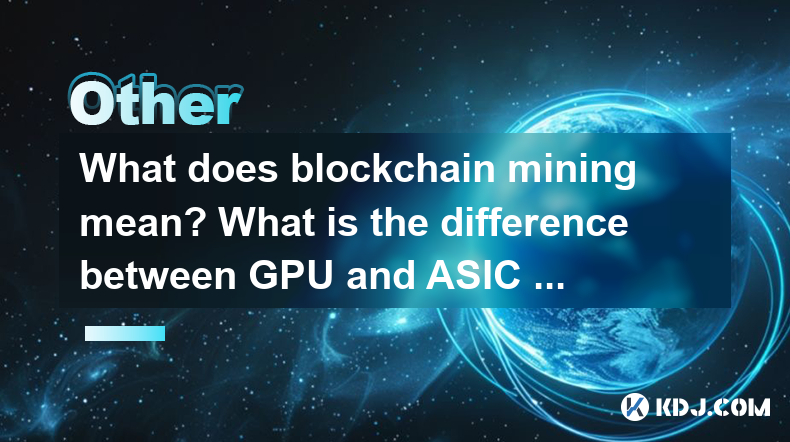
What does blockchain mining mean? What is the difference between GPU and ASIC mining?
Apr 01,2025 at 11:56am
Blockchain mining is a crucial process in the world of cryptocurrencies, particularly for networks like Bitcoin and Ethereum. At its core, mining involves solving complex mathematical problems to validate transactions and add them to the blockchain, a decentralized ledger. Miners compete to solve these problems, and the first to succeed is rewarded with...
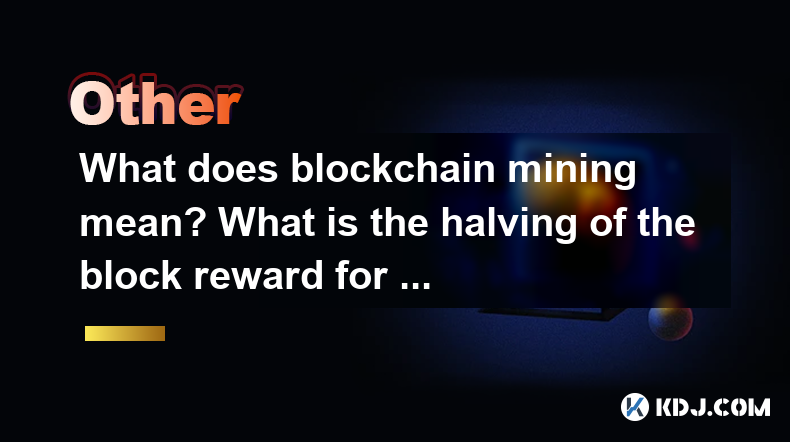
What does blockchain mining mean? What is the halving of the block reward for mining?
Mar 31,2025 at 03:43pm
Blockchain mining is a crucial process in the world of cryptocurrencies, particularly for networks like Bitcoin. It involves solving complex mathematical problems to validate transactions and add them to the blockchain, a public ledger of all cryptocurrency transactions. Miners use powerful computers to compete in solving these problems, and the first t...

What does blockchain mining mean? What are the legal risks of mining?
Mar 31,2025 at 05:07pm
Blockchain mining is the process by which transactions are verified and added to the public ledger, known as the blockchain. Miners use powerful computers to solve complex mathematical problems, which, once solved, allow them to add a block of transactions to the blockchain. In return, miners are rewarded with cryptocurrency, typically Bitcoin. This pro...

What does blockchain mining mean? What is liquidity mining?
Apr 01,2025 at 12:07am
What is Blockchain Mining?Blockchain mining is a critical process in the world of cryptocurrencies, particularly for networks like Bitcoin and Ethereum. It involves the use of computational power to solve complex mathematical problems, which in turn validates transactions and adds them to the blockchain. Miners are incentivized through rewards, typicall...

What does blockchain mining mean? What is NFT mining?
Mar 31,2025 at 04:07pm
Blockchain mining is a crucial process in the world of cryptocurrencies, particularly for networks like Bitcoin and Ethereum. It involves verifying transactions and adding them to the blockchain, a decentralized ledger. Miners use powerful computers to solve complex mathematical problems, which, when solved, allow them to add a block of transactions to ...

What does blockchain mining mean? What is the difference between cold wallets and hot wallets for mining?
Apr 01,2025 at 07:56am
Blockchain mining is a critical process in the world of cryptocurrencies. It involves verifying transactions and adding them to the blockchain, a decentralized ledger. Miners use powerful computers to solve complex mathematical problems, which, when solved, allow them to add a block of transactions to the blockchain. In return, miners are rewarded with ...

What does blockchain mining mean? What is the difference between GPU and ASIC mining?
Apr 01,2025 at 11:56am
Blockchain mining is a crucial process in the world of cryptocurrencies, particularly for networks like Bitcoin and Ethereum. At its core, mining involves solving complex mathematical problems to validate transactions and add them to the blockchain, a decentralized ledger. Miners compete to solve these problems, and the first to succeed is rewarded with...

What does blockchain mining mean? What is the halving of the block reward for mining?
Mar 31,2025 at 03:43pm
Blockchain mining is a crucial process in the world of cryptocurrencies, particularly for networks like Bitcoin. It involves solving complex mathematical problems to validate transactions and add them to the blockchain, a public ledger of all cryptocurrency transactions. Miners use powerful computers to compete in solving these problems, and the first t...
See all articles























































































